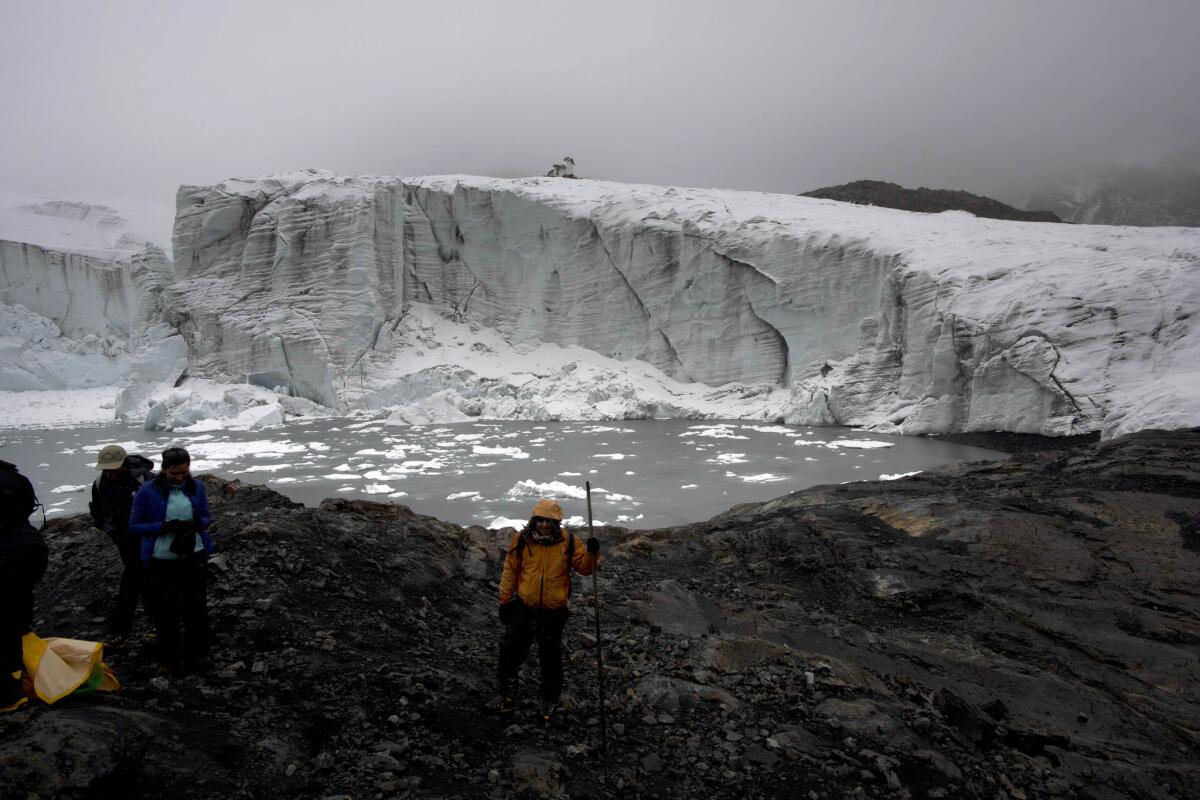Commentary: It’s not a stretch to juxtapose the coronavirus and climate change crises

- Share via
Today we face two global threats that each have the potential to dramatically impact human life, individual livelihoods and society at large. The causes behind both crises are invisible to the naked eye, require policymakers and the public to rely on scientists and, as with most threats, have the potential to be politicized for partisan gain.
Yet they’ve also produced drastically different levels of response. While the coronavirus demands our immediate attention, the juxtaposition of COVID-19 with the climate crisis produces interesting points of comparison worthy of discussion.
In the case of the coronavirus, we’re, of course, talking about a contagious biological danger that strikes suddenly, indiscriminately and causes severe illness. Meanwhile, climate impacts are less direct, less personally invasive and not as clear cut as sick or not sick.
Yet, another important distinction is that COVID-19 comes with a unique fingerprint that doctors can use, or test for, to confirm infection and explain symptoms. In the case of climate change, there is of course no diagnostic that can identify climate change catastrophes — only climate catastrophes.
That is, we can identify hurricanes, floods, droughts and wildfires, but attributing their prevalence or severity to human activity and a warming planet is a much more convoluted process involving multiple scientific disciplines and a wealth of statistics and scientific modeling; after which a visceral sense of urgency gets lost.
Nonetheless, there are important attributes of greenhouse gas emissions that warrant immediate international action once we’ve recovered from the more acutely threatening coronavirus. For one, greenhouse gas molecules, such as carbon dioxide, are multi-generational, lasting 100 years or more in the atmosphere. The ability of these heat-trapping gases to cause and/or exacerbate destruction through rising sea levels, infectious disease, heat waves, floods, droughts, wildfires and extreme weather is therefore extremely long term.
If there is one lesson to be gleaned from the COVID-19 pandemic, it’s that delayed action and inadequate preparation can have devastating consequences. While the Trump administration dithered during the early stages of the pandemic, countries such as Taiwan, South Korea and Germany were early to employ strict mitigation and prevention procedures such as widespread testing and detection follow-up, closing down non-essential businesses, mandating social distancing, and even halting the exportation of face masks while ramping up domestic production. Consequently, death and disease caused by COVID-19 were substantially diminished in these countries.
International successes occurred because leadership and citizenry allowed science to guide policy and was willing to employ the government to carry it out. It was a level of collaboration and commitment not unlike that needed to address the climate crisis.
Unlike COVID-19, the climate crisis doesn’t have to wait for vaccines or breakthroughs. Scientists have identified the problem, engineers have developed solutions, and policy makers have devised a blueprint for action. We must reduce greenhouse gas emissions by phasing out fossil fuels and in turn spurring the transition to a clean energy economy.
To that end, many scientists, economists, business leaders and faith communities have coalesced around a specific policy solution called “carbon fee and dividend.” This policy would correct an important pollution-related market failure by pricing the carbon content of fossil fuel emissions and rebating the revenue equally to all citizens.
Before Congress today are four bipartisan bills which offer variations of this approach. Republicans like that such policies are market-friendly, revenue-neutral and neither increase taxes on citizens nor expand the size of government, while Democrats value the carbon dividend aspect that provides economic justice for low- and middle-income households. The bipartisan nature of this approach and its potential to curb global greenhouse gas emissions at the scale and speed necessary makes such policy particularly attractive.
As scientists, business leaders, politicians and everyday citizens come together to contain the coronavirus, this pandemic will ultimately fade. Meanwhile, the concentration of greenhouse gases and the daunting threat of climate change will only grow.
As 2020 is an election year, it is more important than ever to heed the critical lessons from COVID-19 and apply them toward the next great threat. This means electing leaders that respect science and are prepared to use the instruments of government judiciously to ensure a safe and healthy population as well as a habitable planet for future generations.
Shahir Masri is an assistant specialist in air pollution exposure assessment and epidemiology at UC Irvine.
Robert Taylor is a freelance environmental journalist.
All the latest on Orange County from Orange County.
Get our free TimesOC newsletter.
You may occasionally receive promotional content from the Daily Pilot.



